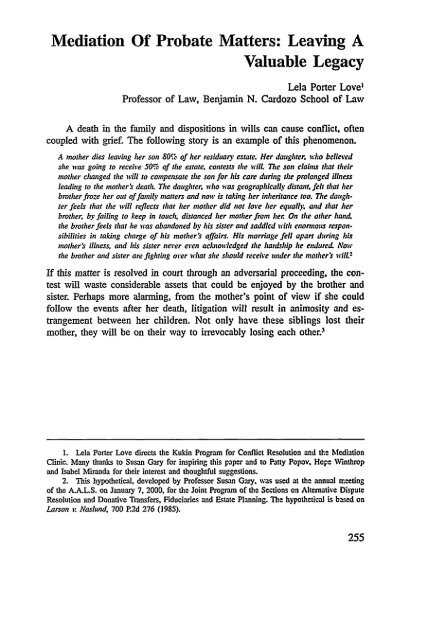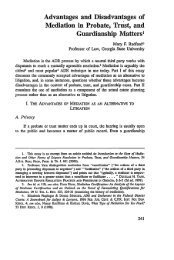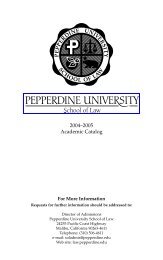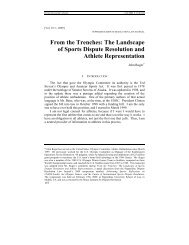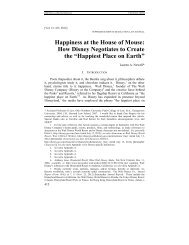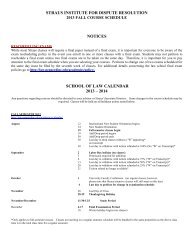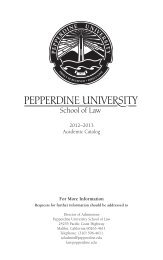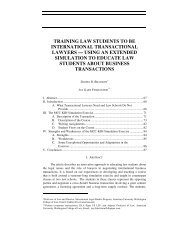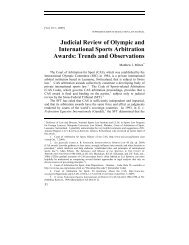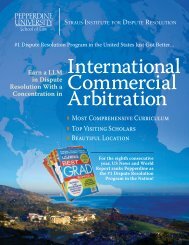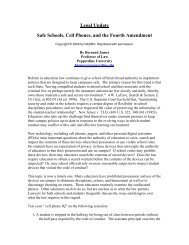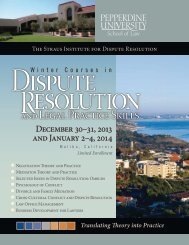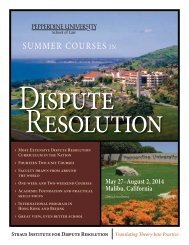Mediation of Probate Matters: Leaving a Valuable Legacy
Mediation of Probate Matters: Leaving a Valuable Legacy
Mediation of Probate Matters: Leaving a Valuable Legacy
You also want an ePaper? Increase the reach of your titles
YUMPU automatically turns print PDFs into web optimized ePapers that Google loves.
<strong>Mediation</strong> Of <strong>Probate</strong> <strong>Matters</strong>: <strong>Leaving</strong> A<br />
<strong>Valuable</strong> <strong>Legacy</strong><br />
Lela Porter Love'<br />
Pr<strong>of</strong>essor <strong>of</strong> Law, Benjamin N. Cardozo School <strong>of</strong> Law<br />
A death in the family and dispositions in wills can cause conflict, <strong>of</strong>ten<br />
coupled with grief. The following story is an example <strong>of</strong> this phenomenon.<br />
A mother dies leaving her son 80% <strong>of</strong> her residuary estate. Her daughter. who believed<br />
she was going to receive 50% <strong>of</strong> the estate, contests the will The son claims that their<br />
mother changed the will to compensate the son for his care during the prolonged illness<br />
leading to the mother's death. The daughter, who was geographically distant, felt that her<br />
brother froze her out <strong>of</strong> family matters and now is taking her inheritance too. The dough.<br />
ter feels that the will reflects that her mother did not love her equally and that her<br />
brother, by failing to keep in touch, distanced her mother from her On the other hand.<br />
the brother feels that he was abandoned by his sister and saddled with enormous respon.<br />
sibilities in taking charge <strong>of</strong> his mother's affairs. His marriage fell apart during his<br />
mother's illness, and his sister never even acknowledged the hardship he endureL Now<br />
the brother and sister are fighting over what she should receive under the mother's will 2<br />
If this matter is resolved in court through an adversarial proceeding, the contest<br />
will waste considerable assets that could be enjoyed by the brother and<br />
sister. Perhaps more alarming, from the mother's point <strong>of</strong> view if she could<br />
follow the events after her death, litigation will result in animosity and estrangement<br />
between her children. Not only have these siblings lost their<br />
mother, they will be on their way to irrevocably losing each other. 3<br />
1. Lela Porter Love directs the Kukin Program for Conflict Resolution and the <strong>Mediation</strong><br />
Clinic. Many thanks to Susan Gary for inspiring this paper and to Patty Popov. Hope Winthrop<br />
and Isabel Miranda for their interest and thoughtful suggestions.<br />
2. This hypothetical, developed by Pr<strong>of</strong>essor Susan Gary. was used at the annual meeting<br />
<strong>of</strong> the A.A.L.S. on January 7, 2000, for the Joint Program <strong>of</strong> the Sections on Alternative Dispute<br />
Resolution and Donative Transfers, Fiduciaries and Estate Planning. The hypothetical is based on<br />
Larson r. Naslund, 700 P.2d 276 (1985).<br />
255
<strong>Mediation</strong> has many advantages for resolving probate matters. <strong>Mediation</strong><br />
is a process where a neutral third party (the mediator) helps the parties: articulate<br />
and understand the underlying perspectives, interests, 4 issues, values and<br />
feelings that each person brings to the conflict; generate and evaluate options<br />
to resolve the issues presented; and gain consensus around mutually acceptable<br />
options. In addition to avoiding the considerable costs <strong>of</strong> litigation, the<br />
benefits <strong>of</strong> mediation for probate disputes include: expressing and addressing<br />
the complex emotional issues involved in a family conflict, possibly improving<br />
the relationships and achieving family reconciliation; 5 avoiding the adversarial<br />
frame that litigation places on disputes; developing a resolution that is<br />
uniquely responsive to individual preferences and priorities and family values;<br />
having family members work together to achieve a resolution, setting a precedent<br />
for future interactions; enhancing satisfaction levels <strong>of</strong> parties who actively<br />
participate in process and durability <strong>of</strong> agreed-upon resolutions; and<br />
maintaining privacy around family matters by avoiding a public forum. 6<br />
<strong>Mediation</strong> has the power to bring parties to a different level <strong>of</strong> understanding<br />
about their underlying situation and about each other, to re-establish<br />
family harmony and to resolve both monetary and relationship issues that<br />
probate matters generally involve. To realize these advantages, this paper<br />
makes two suggestions. First, attorneys should urge testators to consider dispute<br />
resolution provisions in their will. Such provisions allow the testator to<br />
weigh in with a directive that the family pull together and attempt to resolve<br />
its conflicts creatively. A dispute resolution clause can also provide a vehicle<br />
to express and encourage family values connected with the way in which<br />
3. See Thomas L. Hafemeister, End-<strong>of</strong>-Life Decision Making, Therapeutic Jurisprudence,<br />
and Preventive Law: Hierarchical v. Consensus-Based Decision-Making Model, 41 AR. L. Rv.<br />
329, 355 (1999) (stating "excessive, uncontrolled, or unresolved conflict has the potential to create<br />
long-term rifts within family constellations.").<br />
4. Examples <strong>of</strong> interests that can be addressed by mediation (but would not be relevant to<br />
litigation) include a desire for recognition or status within the family, an interest in the deccdent's<br />
love and acceptance, the hope <strong>of</strong> family accord for future generations <strong>of</strong> the family, and so<br />
on.<br />
5. See Ronald Chester, Less Law, but More Justice?: Jury Trials and <strong>Mediation</strong> as Means<br />
<strong>of</strong> Resolving Will Contests, 37 DUQUESNE L. REv. 173, 177 (1999) (citing mediation as the process<br />
most capable <strong>of</strong> achieving family reconciliation).<br />
6. David F. Cavers notes: "there is no form <strong>of</strong> civil litigation more acrimonious and more<br />
conducive to the public display <strong>of</strong> soiled linen and the uncloseting <strong>of</strong> family skeletons than is the<br />
will contest." David F. Cavers, Ante Mortem <strong>Probate</strong>: An Essay in Preventive Law, I U. Chi. L.<br />
Rev. 440, 441 (1934). See generally, for discussions about the benefits <strong>of</strong> mediation for probate<br />
matters: Susan N. Gary, <strong>Mediation</strong> and the Elderly: Using <strong>Mediation</strong> to Resolve <strong>Probate</strong> Disputes<br />
over Guardianship and Inheritance, 32 Wake Forest L. Rev. 397, 423-431 (1997); Peter Y.<br />
Wolfe & Kelly R. A. Mullen, <strong>Mediation</strong> in the <strong>Probate</strong> Court, N.H.B.J. 34, 34 (March 2001);<br />
Chester, supra note 5 at 197-98.
[Vol. 1: 255, 2001]<br />
PEPPERDINE DISPUTE RESOLUTION LAW JOURNAL<br />
family members communicate with each other, value each other and resolve<br />
family conflict. Second, attorneys and mediators operating in the probate<br />
arena should tap mediation's full powers to address all the negotiable issues<br />
the parties may have (not just the legal causes <strong>of</strong> action), so that mediation's<br />
full potential to resolve the entire universe <strong>of</strong> issues presented by a conflict is<br />
not constrained by the blinders that attorneys wear when they operate in an<br />
adjudicative context. 7<br />
CHOOSING MEDIATION: INSERTING DISPUT RESOLUTION PROVISIONS IN<br />
WILLS.<br />
Since mediation has the capacity to foster better communication, understanding<br />
and problem-solving among family members, attorneys should urge<br />
consideration <strong>of</strong> mediation provisions in wills 8 where a testator expresses concern<br />
that his or her passing not engender tension and conflict. In fact, since<br />
most testators would not want their death to be the occasion which sparks a<br />
bitter feud in a family, the question <strong>of</strong> dispute resolution should be raised by<br />
attorneys as a matter <strong>of</strong> routine practice, since testators have the power to direct<br />
9 through their will how such fights can be addressed after their death.<br />
One frequently used method to prevent disputes is an in terrorem or "no<br />
contest" clause,' 0 which essentially disinherits any beneficiary who contests<br />
7. See Leonard L. Riskin, <strong>Mediation</strong> and Lawyers, 43 OHIo ST. L-J. 29, 43-45 (1982)<br />
(describing how a lawyer's perspective is shaped by assumptions <strong>of</strong> adversarial parties and a rule<br />
soluble dispute, while a mediator's underlying premise is that <strong>of</strong> the possibility <strong>of</strong> a collaborative<br />
win-win" outcome, not dictated by law or precedent).<br />
8. The same considerations would apply to drafting trusts for donors who value family relations,<br />
harmony and the preservation <strong>of</strong> trust assets from the ravages <strong>of</strong> litigation.<br />
9. Whether such a direction is precatory or mandatory is unclear. However, an executor<br />
who ignored such a directive might arguably be liable for wasting assets <strong>of</strong> the estate in subsequent<br />
litigation where mediation could have provided a fast and cost efficient method <strong>of</strong> dispute<br />
resolution. Even where all parties willingly participate in mediation, there will be no compulsion<br />
to come to an agreement and hence no assurance that mediation will resolve the matter. The<br />
Fulton County (Atlanta, Georgia) <strong>Probate</strong> Court, which mandates that virtually all cases go to<br />
mediation prior to litigation, has had a 65% success rate in settling cases in mediation. See<br />
Chester, supra note 5, at 1, n. 46.<br />
10. An in terrorem clause is a will provision which attempts to prevent litigation by disinheriting<br />
anyone who contests the will. Such a clause, however, does not prevent litigation; it punishes<br />
the loser in litigation by disinheriting them. A "no contest" clause was used in Larson v.<br />
Naslund, 700 P.2d 276, 278-79 (1985), the case upon which the opening hypothetical is built. In<br />
that case, the clause was upheld, and the testator's child, who contested the will, received $1.00<br />
instead <strong>of</strong> the legacy provided by the will. It is unlikely that the testator desired this result.
the will. There are several problems with this device." The key problem is<br />
that, while it may prevent the wasting <strong>of</strong> family assets in a Bleak House type<br />
scenario, 2 it will not spark a reconciliation between the disputing parties or a<br />
resolution <strong>of</strong> the underlying issues. Mandatory mediation programs in <strong>Probate</strong><br />
Courts are an institutional device to further values achievable by mediation.' 3<br />
If a testator, however, instead <strong>of</strong> including a directive in his will requiring<br />
mediation, relied on the existence <strong>of</strong> a mandatory mediation program in court<br />
to bring the family together, his family will lose the benefit <strong>of</strong> knowing the<br />
testator's own wishes regarding dispute resolution and having the moral persuasion<br />
power <strong>of</strong> those wishes to give mediation some momentum.<br />
Many people, in creating an estate plan, hope to benefit the entire family<br />
as a unit and to advance individual family members. Testators and trustors<br />
who spent a lifetime accumulating assets do not want those assets wasted on<br />
expensive probate litigation. The testator or settlor is in a uniquely powerful<br />
position to require the beneficiaries to mediate a dispute prior to pursuing<br />
other avenues. 14 Parties <strong>of</strong>ten invoke the intent <strong>of</strong> the testator or settlor to<br />
support their position. Often, after a death <strong>of</strong> a family member, those close to<br />
the decedent are looking for ways to honor the decedent's wishes and values.<br />
Consequently, the testator's expressed desire that the beneficiaries resolve issues<br />
themselves in a manner that comports with family values and family history<br />
will be a powerful lever to generate conflict resolution and should be evidenced<br />
in the will or trust.<br />
The instrument can provide that the estate or trust pay for the mediation,<br />
name the site <strong>of</strong> the mediation and identify suitable mediators-all issues that<br />
can be difficult to resolve once conflict is underway. 5 The testator's call for<br />
mediation gives legitimacy and poignancy to the mediation event ins<strong>of</strong>ar as<br />
11. Some jurisdictions do not enforce "no contest" clauses where it is shown that a will<br />
contestant has probable cause to bring a will contest. In other jurisdictions "no contest" clauses<br />
have been held to be violative <strong>of</strong> public policy and hence unenforceable. In Larson, supra note<br />
2, the case upon which the opening hypothetical is built, the court held that the "no contest"<br />
clause was enforceable.<br />
12. Bleak House, by Charles Dickens, is a classic work <strong>of</strong> English fiction that examines<br />
the litigation system. The novel chronicles a lawsuit, Jardyce v. Jamdyce, in which disputing<br />
family members and their attorneys contest a will over a period involving several generations.<br />
Many <strong>of</strong> the characters become embittered and alienated from their family in the process. The assets<br />
<strong>of</strong> the estate ultimately are entirely consumed by legal fees and court costs.<br />
13. See generally, Wolfe & Mullen, supra note 6 (describing a <strong>Probate</strong> Court mediation<br />
program in N.H.). See Chester, supra note 5, at 199-201 (describing mandatory probate mediation<br />
programs in Georgia, Hawaii and Oregon); see also. Gary, supra note 6. at 434-436<br />
(describing probate mediation programs in San Francisco. Hawaii and Oregon).<br />
14. But see supra note 9.<br />
15. See Appendix B for a sample mediation provision.
[Vol. 1: 255, 2001]<br />
PEPPERDINE DISPUTE RESOLUTION LAW JOURNAL<br />
honoring the testator's plan is frequently common ground and provides a motive<br />
for grieving families to participate in good faith in the process despite<br />
their conflict. While property is a useful legacy to leave one's family, leaving<br />
values and direction is also beneficial.<br />
MAXIMIZING MEDIATION: CONSTRUING "ISSUES"<br />
BROADLY.<br />
What is conflict about? Depending on your theory <strong>of</strong> conflict, your pr<strong>of</strong>ession<br />
and the dispute resolution process you are operating in, you might answer<br />
that question differently. Arbitrators, litigators and mediators would give<br />
different answers. For an arbitrator, an issue is a matter or practice that the<br />
agreement to arbitrate specified as arbitrable. For a litigator, an issue is a legal<br />
cause <strong>of</strong> action or defense. One <strong>of</strong> the strengths <strong>of</strong> mediation is its ability<br />
to address a range <strong>of</strong> issues that is far broader than the issues that can be addressed<br />
in either arbitration or litigation. Since attorneys are traditionally<br />
schooled to think <strong>of</strong> "issues" as legal causes <strong>of</strong> action, it is important to<br />
make a radical mental shift when operating in the mediation context so that<br />
"issues" can be seen in an entirely different light-not the spotlight which<br />
pinpoints legal causes <strong>of</strong> action but the more diffuse light that illuminates the<br />
entire terrain. A negotiable or mediable issue is some matter or practice that<br />
one party can control or change which is blocking or frustrating an interest <strong>of</strong><br />
another party. 16<br />
In the conflict above, between a brother who received a 80% portion <strong>of</strong><br />
his mother's will and a sister who received 20%, the "legal" issues (Did the<br />
brother exert "undue influence" on the mother? Were all will formalities<br />
complied with when the mother changed the will? Did the mother/decedent<br />
have testamentary capacity?) may be a smokescreen for other points <strong>of</strong><br />
conflict. 17<br />
16. See Appendix A for a sampling <strong>of</strong> mediable issues.<br />
17. See Gary, supra note 6. at 413 (stating ". .. the identifiable legal issues <strong>of</strong>ten cloak<br />
important emotional, personal, or familial issues. Often the hidden concerns are at the center <strong>of</strong><br />
the dispute, yet the adversarial process either may not address those concerns or may not be able<br />
to resolve those aspects <strong>of</strong> the problem.").
The brother and sister, in the context <strong>of</strong> a discussion, may augment these<br />
issues with a far broader range <strong>of</strong> issues, such as: the way they communicate<br />
with each other; the regard their mother had for each <strong>of</strong> them; the maintenance<br />
<strong>of</strong> family traditions and events; each sibling's conduct toward the<br />
nieces and nephews; and so on. These issues, in mediation, can be treated on<br />
a par with the monetary issue that in a court would be determined by the resolution<br />
<strong>of</strong> the legal cause <strong>of</strong> action.<br />
When operating in an adjudicatory framework, conflicts are about the<br />
resolution <strong>of</strong> a legal cause <strong>of</strong> action by the application <strong>of</strong> a rule or norm <strong>of</strong><br />
general applicability to the given facts. The lawyer, judge, jury or arbitrator<br />
will shape their presentation or understanding <strong>of</strong> the "facts" around the elements<br />
<strong>of</strong> a cause <strong>of</strong> action or defense, wanting to demonstrate that the "case"<br />
either does or does not call for a certain outcome given the intersection <strong>of</strong> the<br />
client's story and the applicable rule. Was the testator unduly influenced by<br />
the actions <strong>of</strong> a recently named beneficiary? Was the will signed by the correct<br />
number <strong>of</strong> witnesses? Did the testator have the capacity to make a will?<br />
The judge, jury or arbitrator will answer these questions by determining<br />
whether the evidence presented satisfies the requirements <strong>of</strong> a specific rule or<br />
the specific language used in the dispositive portion <strong>of</strong> the will. But there<br />
may be other issues that will never be addressed because they do not satisfy<br />
the requirements for a legal cause <strong>of</strong> action. Those other issues not only<br />
might be critically important to the parties, but also might hold the key to a<br />
consensual resolution <strong>of</strong> the issues represented by the legal cause <strong>of</strong> action.<br />
In the example described above, if the sister is satisfied that she was<br />
equally loved by her mother and that the brother in fact did good work that<br />
eased the last years <strong>of</strong> her mother's life, the sister may relinquish (in whole<br />
or in part) her claim to a larger portion <strong>of</strong> the estate. The brother may agree<br />
to contribute to family-building in a way that will enrich his sister's life as<br />
well as his own. Money is not always the answer even when it is presented<br />
in a lawsuit as the question or problem to be resolved.<br />
Imagine the last serious conflict you had in your own family. Would the<br />
"issue" qualify as a legal cause <strong>of</strong> action? A few examples <strong>of</strong> issues that can<br />
fuel family conflicts include: plans, hosting and cooking arrangements for<br />
family events, upkeep and use <strong>of</strong> family property, behavior towards spouses<br />
and in-laws, communication among various family members, public or third<br />
party communication regarding family matters, and disposition and allocation<br />
<strong>of</strong> family property and memorabilia. 8 Most <strong>of</strong> these issues do not constitute<br />
grounds for a court action. Nor do they disappear, however, when a court ac-<br />
18. For a longer list <strong>of</strong> examples, see Appendix A.<br />
260
[Vol. 1: 255, 2001]<br />
PEPPERDINE DISPUrE RESOLUTION LAW JOURNAL<br />
tion is initiated because there is a legal cause <strong>of</strong> action among the issues in<br />
controversy.<br />
In the context <strong>of</strong> negotiation and mediation, conflicts are about whatever<br />
concerns or issues parties raise and are willing and capable <strong>of</strong> addressing.<br />
Neither attorneys nor mediators should artificially limit the set <strong>of</strong> negotiable<br />
issues to the legal cause <strong>of</strong> action. To illustrate the point, imagine that an issue<br />
is being litigated concerning the allocation <strong>of</strong> items in a testator's art collection.<br />
The parties to the dispute are the children <strong>of</strong> the deceased, two<br />
brothers.<br />
" One brother says to his attorney in an interview: "you have no idea how<br />
selfish my brother is. When he was caring for our mother he went through<br />
her house and removed every single family photo album and every picture<br />
in which he was featured." As an attorney planning for a negotiation or<br />
mediation, one should explore whether the allocation <strong>of</strong> family photographs<br />
and photo albums is a negotiable issue that the client would like addressed.<br />
" One brother says in a joint session to the mediator "My brother calls me<br />
at any time <strong>of</strong> the day or night. He expects me to drop everything to listen<br />
to his complaints. Some <strong>of</strong> us have a real life and keep regular hours." The<br />
mediator should raise and explore whether the timing <strong>of</strong> telephone calls is a<br />
negotiable issue that the parties would like addressed.<br />
" One brother says in caucus to the mediator "My brother has no respect for<br />
me and he is ruining my soki. He gave my son access to his N.Y.C. apartment<br />
and allowed him to bring a girlfriend as an overnight guest. He is<br />
corrupting my son! Extramarital sex is against my religion and exposes my<br />
son to life-threatening diseases. Now you understand what an awful person<br />
my brother is!" The mediator should raise and explore whether the son's<br />
sleeping arrangements in his uncle's apartment is a negotiable issue the<br />
brother/father would like addressed.<br />
Lawyers tend to shy away from "messy" issues involving "personal"<br />
matters like photo albums, communication and sleeping arrangements.<br />
Mediators operating in a court or litigation-connected context have a similar<br />
tendency to stick with or emphasize the legal cause <strong>of</strong> action that the complaint<br />
and answer highlights. That tendency should be checked when the dispute<br />
resolution process being employed is negotiation and mediation. While it<br />
is a brave invitation on the part <strong>of</strong> the mediator to ask the parties to display<br />
all the concerns they have with respect to each other, that move can reveal<br />
the true picture <strong>of</strong> what matters need to be addressed for the conflict to be resolved,<br />
and the bargaining agenda can be shaped accordingly.
Several rationales argue for inclusion <strong>of</strong> all issues the parties raise in the<br />
bargaining agenda. 19 Since negotiation and mediation can address multiple issues-broader<br />
than legal causes <strong>of</strong> action-it stands to reason that these<br />
processes should be employed to their full capacity. Furthermore, there is<br />
value in the dispute resolution process addressing what the dispute is really<br />
about, rather than merely those issues cognizable in adjudication. Since mediation,<br />
among the primary dispute resolution processes, is the only third party<br />
process where parties can raise all their concerns, its capacity to do that<br />
should be maximized.<br />
Also, a rich mix <strong>of</strong> issues is more likely to allow for integrative and optimal<br />
resolutions. Each party may get what they value most-sometimes sacrificing<br />
very little in the process. Often parties dig in on money demands when<br />
what they want is recognition for their efforts or their suffering, an apology, a<br />
thank you or a sign <strong>of</strong> love or affection. Parties can have their priority issues<br />
addressed, which may or may not be a "legal" issue. Parties frequently feel<br />
understood and respected if a meaningful accommodation is made around an<br />
issue <strong>of</strong> importance to them, which might provide momentum and motivation<br />
to tackle more difficult issues. And <strong>of</strong>ten multiple issues can allow for productive<br />
trade<strong>of</strong>fs that leave each party significantly better <strong>of</strong>f. Furthermore,<br />
many <strong>of</strong> the issues that lawyers fear, involving communication or interaction,<br />
are sometimes easy to resolve. Given the three examples bulleted above, it is<br />
likely (though one never knows given individual case dynamics!) that:<br />
" The brothers might find a satisfactory allocation <strong>of</strong> family pictures and<br />
photo albums.<br />
" The brother might agree to telephone within time frames designated by the<br />
other brother or to use some other medium to communicate (like email).<br />
• The uncle might agree to limit his nephew's access to his apartment or<br />
specify certain sleeping arrangements when the nephew is in his apartment.<br />
Among the advantages to a broad approach to issue identification is that<br />
each party can describe and define the conflict as they see fit. The attorney<br />
representative and the mediator must capture the issues that the parties describe.<br />
Thus the parties are "empowered" by having the real dispute that they<br />
are experiencing dealt with as the subject matter <strong>of</strong> the process. Of course,<br />
both attorneys and mediators must be trained to identify as negotiable issues<br />
matters that are not necessarily cognizable as legal causes <strong>of</strong> action. Where<br />
attorneys and mediators artificially limit the parameters <strong>of</strong> the discussion to<br />
19. See Leonard L. Riskin, Understanding Mediators' Orientations, Strategies, and Techniques:<br />
A Grid for the Perplexed, I HARv. NEG. L. REv. 7 (1996) (describing mediator orientations<br />
and illustrating that mediators can take a broad or narrow approach to problem<br />
identification).
[Vol. 1: 255, 2001]<br />
PEPPERDINE DISPUTE RESOLUTION LAW JOURNAL<br />
legal causes <strong>of</strong> action, party autonomy, -° important self-expression ("empowerment"),<br />
and interparty understanding or recognition may be foreclosed. 2 '<br />
As a tool for the division and distribution <strong>of</strong> an art collection or other<br />
significant family artifacts, to resolve a question about the optimal guardian<br />
for an orphaned child, to decide who can best serve as the executor or manager<br />
<strong>of</strong> property-these and other issues are ripe for mediation. The testator is<br />
in a position to ensure that the benefits he is distributing do not turn into a<br />
family curse. But rather, the crisis <strong>of</strong> family conflict might be the seed for<br />
building even more harmony than existed before the conflict where a thoughtful<br />
dispute resolution provision is in place.<br />
The costs <strong>of</strong> litigation can be staggering. Litigation can take too long,<br />
can alienate family members from each other and polarize families into warring<br />
camps, sometimes for generations. Funds spent on lawyers can preclude<br />
there being available monies for education and fun. Charles Dickens, in Bleak<br />
House, commented on a successful litigant: "The receiver in the cause has<br />
acquired a goodly sum <strong>of</strong> money by it, but has acquired too a distrust <strong>of</strong> his<br />
own mother, and contempt for his own kind." Most testators want to leave a<br />
richer legacy. It is great news that lawyers have among the panoply <strong>of</strong> available<br />
processes one that promotes understanding and can promote harmony.<br />
Chief Justice Warren Burger once said that lawyers have a traditional role as<br />
"healers <strong>of</strong> human conflict."s <strong>Mediation</strong>, properly used and raised as a step<br />
in the dispute resolution process, allows for a mechanism to promote that<br />
traditional function.<br />
20. See STANDARDS OF Co'Ducr FOR MEDIATORS (Joint Committee <strong>of</strong> Delegates from the<br />
American Arbitration Association, the American Bar Association Sections <strong>of</strong> Dispute Resolution<br />
and Litigation, and the Society <strong>of</strong> Pr<strong>of</strong>essionals in Dispute Resolution) (994) (recognizing selfdetermination<br />
as the "fundamental principle <strong>of</strong> mediation").<br />
21. See ROBERT A. BARUCH BUSH & JOSEPH FOLGER. THe PROMISE OF MEDIATIN (1994)<br />
(describing empowerment and recognition as the central values <strong>of</strong> mediation).<br />
22. Warren E. Burger, Isn't There A Better Hky, ANUAL REPORT ON THE STATE OF TtE Jt.<br />
DICIARY (Jan. 24, 1982).
APPENDIX A: SAMPLING OF "MEDIABLE" ISSUES IN<br />
FAMILY DISPUTES<br />
COMMUNICATION BETWEEN THE PARTIES<br />
" frequency <strong>of</strong> communication<br />
" time <strong>of</strong> day (or night) <strong>of</strong> communication<br />
" method <strong>of</strong> communication (e-mail, telephone)<br />
" the way the parties address each other (e.g., Jamie wants to be called James<br />
and a sibling won't honor that)<br />
" language used in exchanges (a sibling uses four letter words in front <strong>of</strong> another<br />
sibling's child)<br />
COMMUNICATION WITH NON-FAMILY MEMBERS ABOUT FAMILY<br />
AFFAIRS<br />
BEHAVIOR AT FAMILY GATHERINGS<br />
" behavior <strong>of</strong> party or party's spouse or child at family gatherings<br />
" alcohol or drug consumption at family gatherings<br />
" attendance at family gatherings<br />
RELATIONSHIP/INTERACTION WITH EACH OTHER'S CHILDREN<br />
• manner <strong>of</strong> address between adults and children<br />
• calling parent by first name instead <strong>of</strong> title (e.g., mother, father)<br />
* sleeping arrangements for children and their friends in another family member's<br />
house<br />
" gifts for children<br />
ARRANGEMENTS FOR PARENTS<br />
" long-term care for elderly parents (nursing home v. other arrangements)<br />
* use <strong>of</strong> parents' home, automobile or other property<br />
• compensation <strong>of</strong> family member who cares for elderly or disabled family<br />
member<br />
FAMILY HOME, FARM OR OTHER PROPERTY (ART, SILVER, JEW-<br />
ELRY, FURNITURE, PAPERS, MUSICAL INSTRUMENTS)<br />
* disposition <strong>of</strong>, allocation <strong>of</strong>, care <strong>of</strong>, use <strong>of</strong><br />
HOLIDAY CELEBRATIONS<br />
" menu at holiday gatherings<br />
• agenda for meetings or celebrations<br />
* attire at eventsprayer, music, performance, games, television<br />
CONDUCT OF FAMILY BUSINESS
[Vol. 1: 255, 2001]<br />
PEPPERDINE DISPUTE RESOLUTION LAW JOURNAL<br />
APPENDIX B: SAMPLE DISPUTE RESOLUTION CLAUSES<br />
IN WILLS<br />
00.0 Guardian for 17<br />
If my husband, XX, does not survive me, I appoint AA, my sister, BB,<br />
YY's godmother, and CC, my sister-in-law, to determine, in consultation with<br />
and giving deference to the wishes <strong>of</strong> YY, my daughter, which family (and<br />
designated individual) would best serve as guardian <strong>of</strong> the person <strong>of</strong> YY. If a<br />
mediator is needed to help resolve this, or any other, question arising under<br />
this Will, I would like my executor to engage MM to assist in resolving the<br />
issue.<br />
00.0 Dispute Resolution<br />
In keeping with my desire that our family remain strong and harmonious,<br />
any disputes arising under this Will shall be resolved by mediation. The<br />
estate shall pay the cost <strong>of</strong> the mediation. I recommend the following<br />
mediators be considered: AAA (NYC); BBB (Chapel Hill, NC); and<br />
CCC(Palm Beach, FL).
266


